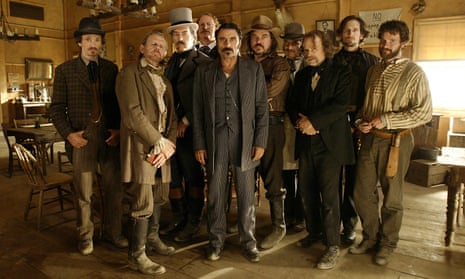Come on you spurs: Deadwood famously never got an ending, but the gloriously profane western is getting a fresh start. From this week, David Milch’s muddy, bloody treatise on lethal frontier realpolitik is being repeated on TV in double-bill chunks, though restricting yourself to two instalments a week when all 36 episodes of the HBO show are available on demand may turn out to be a regimen to which it is impossible to adhere. And if that sounds like an odd way to put it, blame the addictive inversions of Milch’s ornate, ornery dialogue, where high ambitions, base desires and extraordinarily satisfying insults are expressed in quasi-Elizabethan gutter poetry.
If you devoured it first time round – Deadwood debuted in 2004, a time when HBO was defined by the Sopranos and Sex and the City – the worry may be that it might struggle to live up to some idealised memory. Thirteen years is a long time in TV, and HBO recently rolled out an upgraded model that seemed designed to supersede Milch’s hardscrabble original. Westworld offered the same tumbleweed pleasures of a widescreen western but added the faltering first steps of artificial intelligence achieving consciousness. Why settle for the intrigues of carving out a viable settlement in 1870s Dakota when you could luxuriate in sci-fi crammed with six-shooter toting sexbots?
Deadwood’s old-fashioned, doggedly linear approach to storytelling might even seem quaint compared to Westworld’s multiple timelines and scattering of cryptic narrative breadcrumbs across the prairie. Most episodes unfold over the course of a single day in the rambunctious camp, observing life in a plausibly ramshackle gold-rush settlement purposefully established in contested territory to exist beyond the reach of lawmakers. But the setting feels like an apt metaphor for the show itself: an outpost that stands alone, leery of the status quo, while the rest of the world, sensing something exciting and potentially valuable, tries to muscle in.

Is it a historical drama? Yes, in that some of Deadwood’s key players are based on real people, like Timothy Olyphant’s ramrod-straight Seth Bullock, Ian McShane’s purring saloon proprietor Al Swearengen, and Keith Carradine’s ageing sharpshooter Wild Bill Hickok, a symbolic embodiment of the old west. But while sticking broadly to the historical record, showrunner Milch – a veteran writer who sharpened his craft on Hill Street Blues and NYPD Blue – seemed more interested in exploring how outlaws and outcasts engage with ad hoc civilisation-building, describing his creation as “American society going at warp speed”.
Over three seasons, Deadwood’s initial lawlessness mutates into something more recognisable as a functioning society (even if the majority of the inhabitants are drunks, junkies, gamblers and bushwhackers). But to make it sound like a firewater-soaked, rootin’-tootin’ version of classic strategy video game Sim City is to undersell the sheer, overwhelming vitality of the enterprise. Every character in the sprawling cast feels three-dimensional and vivid in a way no other drama has matched, the harsh setting seemingly sharpening their appetite for self-expression. It is profound, shocking, witty and often very moving.
Revisiting Deadwood does bring up the painful issue of whether it will ever return. A contentious cancellation just before its third season was aired robbed Milch of the opportunity to craft a definitive ending. But Deadwood’s unfinished status now feeds into its myth as an outlier masterpiece. Recently, HBO confirmed that Milch – who has had a notably tumultuous time in the interim – was in talks to wrap up the saga as a movie. As recently as January, it sounded as if a revival might happen. But if you were to take one lesson from the show, it might be to focus on what’s in front of you rather than get vexed about the future. Think of Al Swearengen, warily observing the raising of telegraph poles on the outskirts of camp, heralding the encroachment of the outside world in a flurry of dots and dashes: “Ain’t the state of things cloudy enough? Don’t we face enough fucking imponderables?”
The repeat run of Deadwood starts on Friday on Sky Atlantic at 11.20pm.

Comments (…)
Sign in or create your Guardian account to join the discussion